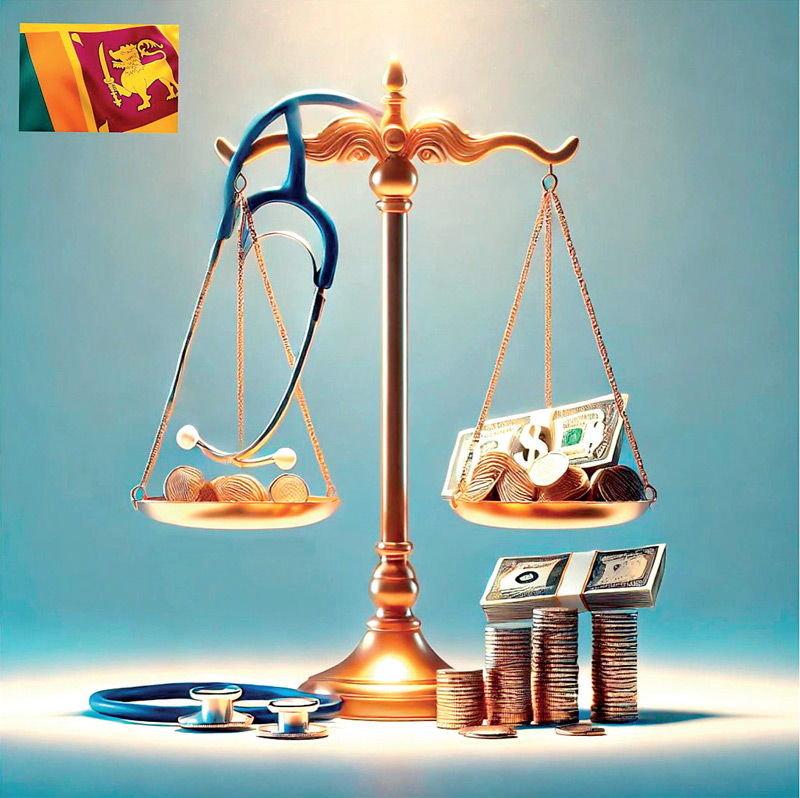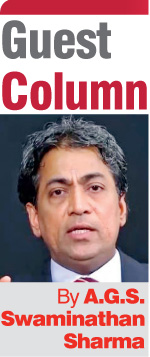Saturday Feb 21, 2026
Saturday Feb 21, 2026
Monday, 10 February 2025 00:50 - - {{hitsCtrl.values.hits}}

|
 As the saying goes, “A nation’s wealth lies in the health of its people.” It’s time for Sri Lanka to prioritise this wealth, ensuring that every citizen benefits from a healthier, more secure future. Reinstating this policy is a step forward in building a resilient economy powered by strong, healthy human resources.
As the saying goes, “A nation’s wealth lies in the health of its people.” It’s time for Sri Lanka to prioritise this wealth, ensuring that every citizen benefits from a healthier, more secure future. Reinstating this policy is a step forward in building a resilient economy powered by strong, healthy human resources.
“In recent tax periods, individual taxpayers in Sri Lanka were allowed to deduct medical expenses, local education expenses, housing loan interest, contributions to local pension schemes, and expenses incurred for purchasing shares. These deductions were capped at a maximum of Rs. 1,200,000 per year of assessment when calculating taxable income.”
This provision was a significant relief for taxpayers, providing not only financial savings but also incentivising better health outcomes. However, its removal has left a notable gap in the tax framework, impacting individuals and the broader economy. Reinstating this deduction is an imperative step that policymakers should consider, with multiple advantages spanning economic, health, and fiscal domains.
Financial benefits for individuals and the nation
Allowing medical expenses as a deductible item offers direct financial benefits to taxpayers by reducing their taxable income, resulting in lower tax liabilities. For many families, this relief can be a lifeline, enabling them to allocate resources toward quality healthcare services.
Moreover, healthier individuals translate into a more productive workforce. Improved access to healthcare, spurred by such tax incentives, can lead to reduced absenteeism and higher productivity levels. This would position Sri Lanka to cultivate a human resource base that is both skilled and physically capable of driving the nation’s economic progress.
Enhanced revenue collection through transparency and tracking
Reinstating this deduction provides the Inland Revenue Department with an invaluable opportunity to enhance tax compliance and revenue collection. By mandating that all medical expenditures eligible for deductions be transacted through approved banking channels or automated systems, the government can:
1.Track income of healthcare providers: Doctors, hospitals, pharmacies, and other healthcare providers receiving payments for services will fall under greater scrutiny. This ensures that these sectors are fully integrated into the tax system, capturing income streams that might otherwise remain unreported.
2.Boost VAT and other tax revenues: Increased traceability of transactions will naturally lead to higher compliance with VAT, SSCL, and other tax obligations within the healthcare and related industries.
3.Promote a cashless economy: Encouraging medical payments through automated banking systems aligns with the government’s vision for a cashless economy. It minimises tax leakages, enhances systemic efficiency, and fosters financial inclusivity.
Industry-specific impacts of reinstating tax-deductible medical expenses
The reintroduction of tax-deductible medical expenses will have profound implications across several critical industries, catalysing growth and innovation:
By targeting these key industries, the ripple effects of reinstating this deduction will not only improve individual taxpayer relief but also drive sustained economic growth in Sri Lanka.
International precedents
Several countries have implemented tax frameworks that allow medical expenditures as deductions, showcasing the tangible benefits of such policies:
1.United States: In the US, taxpayers can deduct qualified medical expenses that exceed 7.5% of their adjusted gross income. This provision supports individuals facing high medical costs while ensuring healthcare expenses are effectively documented.
2.Australia: The Australian tax system previously allowed a “Net Medical Expenses Tax Offset,” incentivising healthcare spending and ensuring traceability of medical payments.
3.Canada: Canada’s tax code permits the deduction of medical expenses that exceed 3% of net income. This policy has been instrumental in reducing financial strain on taxpayers while promoting healthcare access.
4.India: In India, Section 80D of the Income Tax Act allows deductions for medical insurance premiums and healthcare expenditures for senior citizens, encouraging both preventive and curative healthcare practices.
“Section 80D of the Income Tax Act provides deductions for medical insurance premiums.”
Eligibility – Individuals and Hindu Undivided Families (HUFs) can claim deductions under this section.
Companies or firms cannot claim deductions under this section.
Deductions allowed
Example: Mr A pays his life insurance Rs. 25,000 along with his parents aged 60 years Rs. 50,000 and spends Rs. 10,000 on medical check-up then while filling IT he can claim Rs. 80,000 (Rs. 25,000/+Rs.50,000/+Rs.5,000/) as deduction under Sec 80D of IT act
These examples demonstrate how strategic tax policies can simultaneously benefit taxpayers and governments, a model Sri Lanka can adapt to its unique context.
Case studies from other countries
The benefits of allowing medical deductions have been particularly visible in countries like the United States and Canada:
Fiscal benefits for the Government
The reinstatement of medical deductions will not only benefit taxpayers but also bolster Government revenue in the long run. By incorporating healthcare transactions into formal channels, the Government can:
1.Reduce underreporting of income by healthcare providers.
2.Increase compliance rates for VAT, income tax, and related taxes.
3.Strengthen overall tax administration through enhanced data collection.
Long-term socio-economic impact
1.Healthcare savings: A healthier population reduces the Government’s long-term burden of healthcare subsidies and public health expenditures.
2.Workforce productivity: Healthy workers contribute to sustained economic growth by minimising productivity losses from illness.
3.Education and awareness: A policy promoting healthcare spending fosters a culture of health awareness, ensuring a better-informed and proactive citizenry.
Policy recommendations
To maximise the benefits of reinstating medical expenditure as an allowable deduction, policymakers should consider the following:
1.Set a realistic deduction ceiling: Reintroduce a deduction limit that reflects current healthcare costs, ensuring the benefit remains meaningful for taxpayers.
2.Implement a digital tracking mechanism: Mandate that all deductible medical expenses be transacted through approved banking systems. This will enhance transparency and minimise fraudulent claims.
3.Incorporate health insurance benefits: Encourage taxpayers to invest in health insurance by allowing premiums to be included within the deduction framework.
4.Strengthen taxpayer awareness: Launch campaigns to educate taxpayers about the benefits of declaring medical expenses, fostering a culture of compliance and health consciousness.
5.Leverage technology for compliance: Use advanced analytics and AI tools to monitor and analyse medical transactions, ensuring compliance and reducing administrative burdens.
A holistic approach for long-term gains
Reinstating medical expenditure as an allowable deduction is more than a tax policy change; it is an investment in the health and well-being of Sri Lankans. By reducing the financial burden on taxpayers, incentivising healthcare access, and strengthening related industries, the Government can foster a healthier, more productive population. Additionally, integrating digital payment systems will modernise Sri Lanka’s tax infrastructure, driving greater compliance and revenue generation.
It is now up to policymakers to recognise the multifaceted benefits of this initiative and act decisively. By reinstating this provision, Sri Lanka can set a precedent for progressive tax policies that balance individual relief with national growth, paving the way for a healthier, more prosperous future.
As the great Greek physician Hippocrates said, “Health is the greatest of human blessings.” By incentivising healthcare access through progressive tax policies, Sri Lanka can ensure that its citizens are both healthy and financially secure, paving the way for a resilient and prosperous nation.
(The writer holds an MBA (UK), FCA (SL), FCMA (UK), FCPA (Aust.), CMA (Aust.), FCMA (SL), MCPM (SL), CGMA (GLOBAL). He is Managing Partner at A.G. Sarma (Chartered Accountants) since 1971, and Chartered Accountant, Tax and Management Consultant. He can be reached via: [email protected] | www.agsarma.com.)